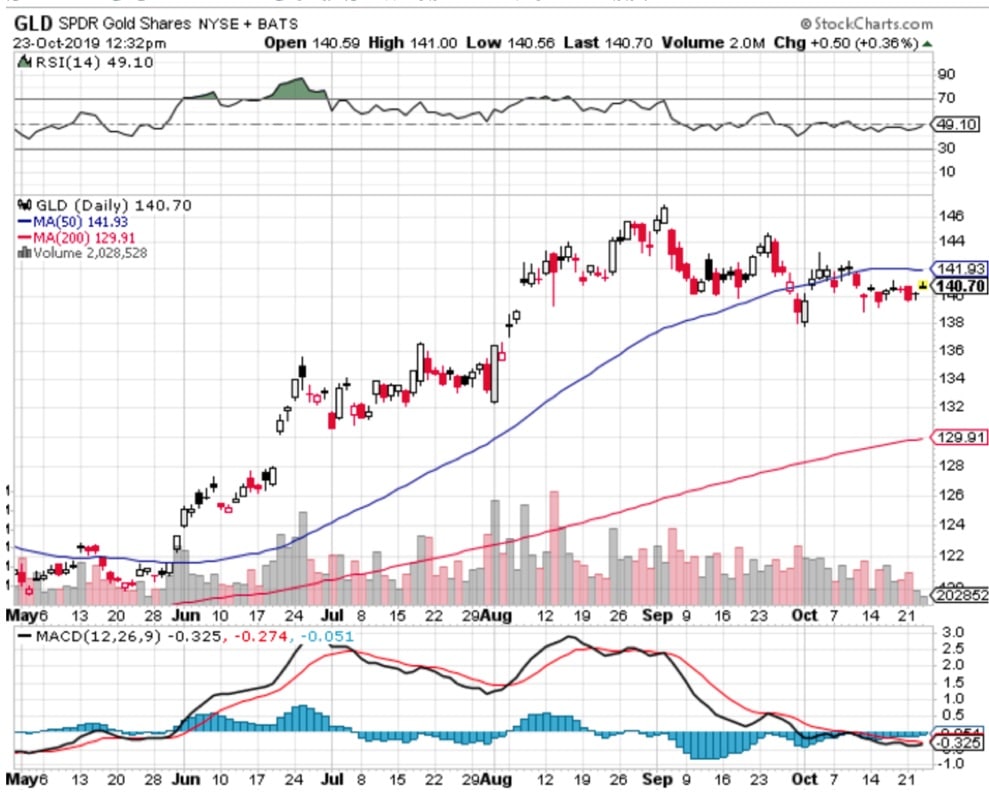SPDR Gold Trust has a net asset value of $43,907.96 million (October 23, 2019), with a bid price of $140.18 per share. The fund has generated a year-to-date return of 15.55% (30 September 2019), with a 1-year return of 24.61%.
The 3, 5, and 10-year returns of SPDR Gold Trust have been lacklustre, given the stellar performance of equities markets. It is generally accepted that gold is a safe-haven asset which prospers when equities markets sour.
Given the volatility vis-a-vis the US/China trade war, uncertainty in the Middle East with Iran’s attack on Saudi Arabian oil fields, and the decision to abandon the Kurds in Syria, it comes as no surprise that gold stocks and ETFs have prospered this year.

When markets get jittery, traders and investors tend to divert resources away from traditional investments like tech stocks on the NASDAQ, emerging markets like Brazil, Russia, India, China, and South Africa (BRICS countries), and industrials, financials, and other stocks.
Conventional wisdom states that during recessionary times, or contractionary economic cycles, income stocks, value stocks, and growth stocks are best to hold, with greater diversification into other investment classes like bonds, commodities, fixed-interest-bearing investments, and of course gold.
SPDR Gold Trust serves precisely that purpose, and its performance since June 2019 is indicative of a shift to gold among traders and investors.

The Performance of SPDR Tracks the Gold Price
Consider the 50-day moving average and the 200-day moving average figures for SPDR Gold Trust as cases in point. The 200-day MA is currently priced at $129.91 per share, and the 50-day MA is priced at $141.93 per share.
At the current market price of $140.18 +/-, SPDR is trading substantially higher than its long-term moving average, and fractionally less than its short-term moving average.
This indicates a softening of demand for gold in recent weeks, given the resilience of equities markets.
Proof of this is found in the levels currently enjoyed on the NASDAQ (8112.25), NYSE (13,096.4905), Dow Jones Industrial Average (26,816.68), S&P 500 (2999.21), and the Russell 2000 (1553.64).
GLD was established on 18 November 2004, and since inception the fund has generated an overall return of 8.06%. Unlike a traditional stock, this exchange traded fund (ETF) invests in the performance of the , not a particular gold mining company. In other words, it tracks the gold price.
It may prove cost-effective to many investors to purchase GLD shares as opposed to physical stores of gold bullion given that the costs of insuring and storing actual gold are expensive, and the risks are high.
In all other regards, this ETF is similar to stocks in that traders and investors can buy and sell GLD quickly, easily and effectively through a reputable brokerage.
Given that the price of gold determines the value of GLD (a positive correlation), one can expect a bullish gold market to bode well for GLD stocks, and a bearish gold market to apply downward pressure on the fund’s performance.
At the time of writing (23 October 2019), the price of gold per ounce was listed at $1,493.92 – marginally less than the 1-year high of $1551 per ounce achieved in September 2019.
In fact, the price of gold is near the 5-year high, indicating that SPDR is performing at multi-year highs. Analysis of the fund’s performance indicates a steady appreciation post global financial crisis, followed by a period of consolidation after 2012.
While the year-to-date return of 15.55% is certainly a , the 1-month performance has been negative. Since 100% of the assets in this ETF are gold, it is the world’s largest fund holding of gold.
The company owns gold bullion shares are offered at a fraction of the gold price, less fund expenses to track the performance of gold. One of the most important determinants of the gold price is the USD. Since gold is a dollar-denominated financial asset, its strength or weakness is heavily dependent on the dollar.
When the USD is strong, relative to other currencies, foreign buyers of gold have to pay more per unit of their currency for the equivalent gold holding.
Conversely, when the USD is weak, foreign buyers of gold get more bang for their proverbial buck and can own more gold shares with their currency.
As the Fed moves to cut interest rates further, we could be in line for a weaker dollar and stronger demand for gold. This will boost the price of SPDR moving forward.
All eyes will be on on October 30, 2019, and the FOMC minutes which follow several weeks later on November 20. If US economic activity reflects subdued macro trends, rate cuts are the most effective means of boosting overall economic activity. This will weaken equities markets and drive investment to gold.
Disclaimer: This is a contributed article and should not be taken as investment advice
Disclaimer: This is a contributed article and should not be taken as investment advice
Disclaimer: This is a contributed article and should not be taken as investment advice
Disclaimer: This is a contributed article and should not be taken as investment advice
Disclaimer: This is a contributed article and should not be taken as investment advice
Disclaimer: This is a contributed article and should not be taken as investment advice





Be First to Comment